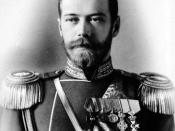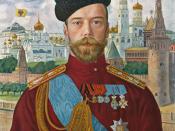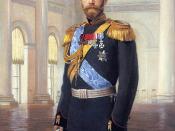Problems struck Russia in 1917, when a great revolution broke out. The citizens of Russia didn't appreciate how the Tsar was ruling the country. Even before the revolution, Tsar Nicholas II maintained his power through the recruitment of a mammoth army of policemen and monitor spies. Every progressive political association and scheme was forbidden. Tsar Nicholas II refused the request of the Church to convene a council to deal with urgently needed reforms for the Russian Church that could revitalize her mission to the world, fearing that a Church council might threaten his grip on power. Okhrana, 'To the Emperor of All the Russians belongs the Supreme Autocratic Power. God himself commands that he be obeyed, not only from fear of God's wrath, but also for the sake of one's conscience' Nicholas's position was little changed by the Fundamental Laws. Article 4 stated: 'To the Emperor of All the Russians belongs the Supreme Autocratic Power.
God himself commands that he be obeyed, not only from fear of God's wrath, but also for the sake of one's conscience'. He could veto laws proposed by the Duma, retained the power to appoint ministers, which enraged liberals who had hoped for a cabinet composed of their own representatives, and had the power to make war and peace. He could also dissolve the Duma and call elections when he wished, and had the right of issuing emergency decrees when the Duma was not in session. The government used this power to bypass the Duma, and in doing so undermined whatever respect for the constitution might have existed. However, the Tsar had promised to uphold the Fundamental Laws, and not to change them without the agreement of the Duma. For the first time a Russian Tsar had accepted that there were limits...


